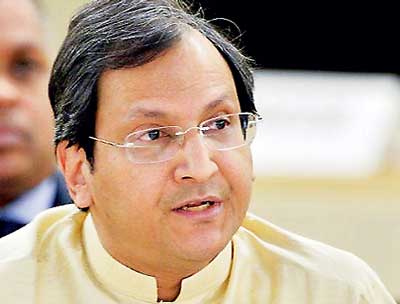Wednesday Feb 25, 2026
Wednesday Feb 25, 2026
Tuesday, 12 September 2017 00:00 - - {{hitsCtrl.values.hits}}
The Sri Lanka’s Permanent Representative to the UN in Geneva Ambassador Ravinatha Aryasinha has called on Colombo Process (CP) member states to bring together consular representatives from Asian migrant sending countries in the GCC region, to share experiences and best practices in meeting the day-to-day consular support needs of migrants. 
Noting that low and semi-skilled migrant workers from the CP countries in the GCC faced similar issues, and recalling the decision of the CP Ministerial Meeting held in Colombo in August 2016 to embark on ‘Consular Cooperation’ as a new thematic area among CP countries stationed in GCC, he welcomed the operationalisation of this process through the recent convening of an IOM sponsored Migrants in Countries in Crisis Initiative’s (MICIC) workshop in Kuwait to address the emergency aspects of ‘Consular Support’.
He urged that the idea to bring together consular staff from CP countries in destination countries should be replicated in other GCC countries as well, and must also focus on the day-to-day consular support needs of migrants and to collaborate with destination countries for mutual interest. Ambassador Aryasinha while congratulating Nepal for assuming the Char of the CP made these observations at the first Ambassadorial Level Meeting of the Colombo Process (CP) – a regional consultative process of contractual labour sending countries in Asia, convened by Nepal in Geneva recently, following the handing over of the CP Chairmanship that had been held by Sri Lanka from 2013-2017.
The Ambassador of Nepal and all CP Member States thanked Sri Lanka as the outgoing Chair of the CP for the impressive action oriented work carried out for the expansion of CP, including by introducing four new thematic areas, namely ‘consular support for migrant workers’, ‘promotion of equality for women migrant workers’, ‘operationalisation of the migration-related SDG Goals’, and ‘migrant health’, to the ongoing five thematic areas on ‘ethical recruitment’, ‘skills development and recognition’, ‘pre-departure orientation’, ‘remittances’, and ‘labour market research’.
Meanwhile addressing an Expert Level Meeting of the CP Member States in Geneva on 7 September 2017 to discuss the draft outcome Statement of the forthcoming Kathmandu Consultations on the Global Compact on Migration (GCM), Deputy Permanent Representative of Sri Lanka to the UN in Geneva, Samantha Jayasuriya has said, given its sheer size of the labour migration movements in the Asia-GCC Corridor and the specific challenges it faces in migration governance, in its submission to the GCM consultation process, the Colombo Process (CP) must flag more specifically the issues of interest to the CP’s economic migration practices and its impact on development based on its all nine action areas of focus, rather than presenting issues of a generic nature. Noting that the CP had during Sri Lanka’s Chairmanship developed processes and best practices on managing labour migration and represents a unique and dynamic RCP, Jayasuriya said, the CP should use the forthcoming opportunities within the GCM consultation process – in Nepal, Switzerland and Mexico, to highlight the concerns and views of the Asian labour originating countries.
Referring to Sri Lanka’s role as the current Chair of the Abu Dhabi Dialogue (ADD) – a RCP consisting both the labour sending and receiving countries said that the ADD has already submitted its inputs for the GCM following consultations through correspondence and based on a two-day workshop held in Dubai. The ADD inputs focused on the four key areas adopted at the 4th Ministerial consultation held in Colombo in January 2017, namely ‘ethical recruitment’, ‘skills recognition and development’, ‘comprehensive information orientation programme (CIOPs)’ and ‘using advanced technology’.
She elaborated on the recommendations made on these themes and said in the destination countries in the GCC they are making certain changes including in the domestic labour management sector and there is prospect for collaboration within ADD to improve labour migration governance. Sri Lanka as the Chair of the ADD and a member of the CP, will attend the Global RCP Meeting to be hosted by the IOM in Geneva in October, the 6th Informal Thematic Session of the ongoing UN Intergovernmental consultation on Global Compact on Migration on the theme of ‘Irregular migration and regular pathways including decent work, labour mobility, recognition of skills and qualifications’ scheduled to be held from 12-13 October in Geneva, and the GCM stock taking meeting in Mexico in December.
Sri Lanka’s period as Chair of the CP also saw an expansion in the CP membership, and the strengthening of relations with other migration related Processes and Partners, including the Abu Dhabi Dialogue (ADD), the European Union (EU), the Global Forum on Migration and Development (GFMD) and the Special Rapporteur on the Human Rights of Migrants. During Sri Lanka’s stewardship the CP also strengthened the institution building process by operationalising a self-funding mechanism and formalised the engagement among Geneva-based CP Member States to facilitate regular dialogue and work during inter-sessional periods between Senior Officials and Ministerial Meetings (SOMs).